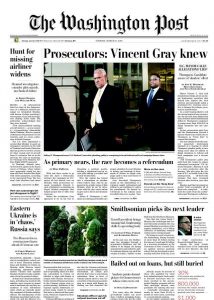 Imagine, on the eve of a contested election, a top law enforcement official accuses a candidate of potentially serious misconduct. But instead of putting the charges before a judge or jury, the top official levels them in the court of pubic opinion, just as voters head to the polls.
Imagine, on the eve of a contested election, a top law enforcement official accuses a candidate of potentially serious misconduct. But instead of putting the charges before a judge or jury, the top official levels them in the court of pubic opinion, just as voters head to the polls.
Sound familiar?
Hillary Clinton isn’t the first to face this. It happened just two years ago.
The office at stake wasn’t 1600 Pennsylvania Avenue, but 1350 – the D.C. mayor’s office.
And the response of the media wasn’t widespread condemnation as it is today.
In 2014, D.C. Mayor Vincent Gray was leading his primary challenger, Muriel Bowser. Then U.S. Attorney Ron Machen stepped in.
The timing of FBI probe into @HillaryClinton email feels a lot like Ron Machen's probe into Gray's campaign. Hope the impact is different.
— Andy Shallal (@andyshallal) October 29, 2016
Just a week before early voting began, Machen accused the mayor of knowing about a shadow campaign that aided Gray’s upset win four years earlier.
Despite Machen’s years-long investigation, he never turned his accusations against Gray into charges; nor did his successor, who quietly brought the investigation to a close five years after it began.
Machen’s actions had an impact: Gray was defeated, his reputation badly tarnished.
“My reelection was sabotaged, and District voters were duped,” Gray wrote in a recent op-ed entitled “I know what it’s like when law enforcement intervenes in an election. It happened to me.”
Eric Holder, the former attorney general and Machen’s boss at the time, defended Machen’s election-eve accusations.
In 2014, AG Holder said it was right for DOJ to disclose DC Mayor probe on eve of election via @HuffingtonPost https://t.co/oIKoebmYgQ
— Patrick Madden (@Patrick_Madden) October 31, 2016
But now Holder is “deeply concerned” with this practice – at least when it comes to Clinton, who he’s supporting.
Last week, FBI Director James Comey sent a vague, unsolicited letter to Congress (and thereby the public) saying the FBI was revisiting its previously closed investigation into Clinton’s use of a private server for emails.
President Obama weighed in, criticizing Comey without naming him. “We don’t operate on incomplete information,” Obama said.
Holder also rebuked the FBI director. By discussing his “personal opinions” on the eve of the election, Comey committed “a stunning breach of protocol” which “may set a dangerous precedent,” Holder wrote in an op-ed.
Holder’s hypocrisy is outdone by the media, led by the Washington Post.
Today the Post, which is backing Hillary Clinton, is alarmed by the “damage Comey’s bad timing could do.”
But when it was Gray being targeted, the Post had a different response.
When asked to explain the diff between Gray/Machen/2014 & Clinton/Comey/2016 @washingtonpost refused to comment https://t.co/Q9phm2hXYm
— Vince Gray (@VinceGray2016) November 2, 2016
“Charges should be brought now — before D.C. voters head to the polls,” pleaded Post columnist Colbert King. “Just get on with it.”
Days later, when Machen leveled his accusations against Gray, they were splashed atop the Post’s front page “in type large enough for declarations of war,” wrote housing organizer Jim McGrath.
This was part of the Post’s long-running campaign against Gray, who’s likely to regain his former seat on the D.C. Council next week.
As Clinton seeks to overcome the FBI’s last minute interference, Gray hopes the media’s pushback – so sorely missing in his case – will set a precedent.
Perhaps the outcry over Comey’s actions will result in stricter enforcement of rules or repercussions the next time Justice Department officials inappropriately and unnecessarily inject themselves into elections.
